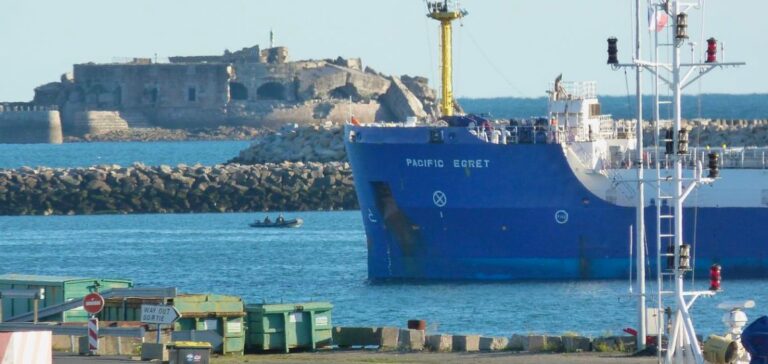Two ships carrying MOX, a nuclear fuel containing plutonium, left Saturday morning from the port of Cherbourg (Manche) to Japan, where they are to deliver their cargo in November, an AFP photographer noted.
“The specialized vessels Pacific Heron and Pacific Egret of the British company PNTL have left the port of Cherbourg,” the French nuclear group Orano wrote in a statement.
“We transported the second MOX fuel package, which left the Orano La Hague site to the port of Cherbourg, and the package was then loaded onto the boat,” Orano had explained to AFP earlier in the morning.
The loading operation was carried out “successfully” and this is the second package brought to Cherbourg from the town of La Hague, 20 km away, after the one that arrived in the Normandy port on September 7.
A technical problem – the failure of a gantry crane – prevented the nuclear fuel from leaving for Japan.
“The shipment is expected to arrive in Japanese territorial waters during November,” the nuclear group said in its statement, recalling that this is the eighth time Orano has transported MOX from France to Japan.
The cargo was loaded at around 03:00 on the port, where the forces of order were present, then the ships started their journey a little before 10:00, according to the AFP photographer.
The previous transport of MOX from Cherbourg to Japan dates back to September 2021, when the ship left the port in the afternoon following the morning of the fuel loading.
75,000 fine for anyone approaching MOX.
According to Orano, MOX is a nuclear fuel that allows the recycling of spent fuel. It is made from materials from the spent fuel in the power plants to produce electricity.
“In a world today extremely destabilized, in crisis with Russia as well as with China and Taiwan, transporting such dangerous materials from a nuclear proliferation point of view is completely irresponsible,” said Yannick Rousselet of Greenpeace France.
According to Orano, “the plutonium contained in MOX is not the same as that used by the military”.





















